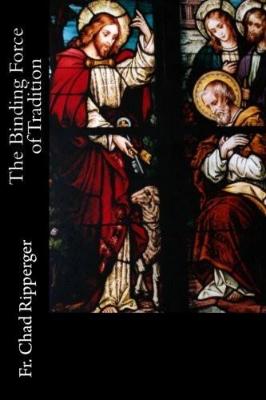
The Binding Force of Tradition
Publication Date: March 11, 2013
Format: Paperback
Pages: 62
Delivery in 2-9 business days.

In The Binding Force of Tradition, Fr. Ripperger provides a study of the object and nature of Sacred Tradition and the moral requirement of Catholics to accept the Sacred tradition. Sacred tradition and the Magisterium are surprisingly complex albeit important topics, especially when dealing with the sensus fidelium and the ordinary Magisterium.
Fr. Ripperger answers several vital questions including: "Since normally the rule of faith is the teaching of tradition and Scripture as taught by the Magisterium, what does one do when the members of the Magisterium lapse into heresy?" This has been an especially important question in modern times.
Many Catholics wonder whether the rejection of tradition is a sin. Fr. Ripperger gives a clear and concise answer: yes it is. He goes on to provide a brilliant analysis of how it is in fact a sin against charity, hope, justice, and more.
Fr. Ripperger, in his characteristic manner, leaves no stone unturned. Delve into The Binding Force of Tradition to find out the answer to all of your questions on Catholic tradition.
"The rite of the Mass must have all its splendor bequeathed to it by the tradition because, insofar as it does so, it will appeal to what is noble in man and it becomes an instrument of conversion, which was often the case before the Second Vatican Council. Many people converted due to the sheer splendor, clarity, and depth of the ancient liturgy."
"As was observed, tradition is very similar to law; each time the tradition is changed, it erodes the force of the tradition. Changing the minor traditions of the little things results psychologically in people beginning to question the bigger things, the more important things, as well as the things that cannot be changed, especially when a number of things are being changed. Because so many of the traditions have been changed within the Church, we now have generations that lack virtually any knowledge of the tradition or any concept that the tradition morally binds them. This is an injustice against the two generations that have been robbed of the Church’s doctrinal, moral, and disciplinary patrimony."
"When novelty arises, confusion ensues. One of the effects of novelty or heresy is that it tends to confuse the faithful rather than to clarify what the Church has always believed. Authentic development of doctrine always provides a clearer understanding of the constant teaching of the Church. Novelty does not."
"The proposition of modernists is that the rule of faith is immanent, i.e. without ourselves and so we judge what we are to believe based upon our own personal experience."
"Notional assent is an intellectual judgment that a particular proposition is true but in the practical living of a person’s life, it is not followed."